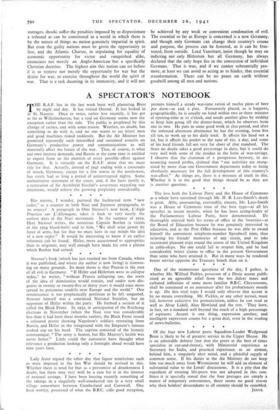Lady Astor argued the other day that liquor restrictions such
as were imposed in the last War should be revived in this. Whether there is need for that as a preventive of drunkenness I doubt, but there may very well be a case for it in the interest of national savings. I have been hearing recently something of the takings in a singularly well-conducted inn in a very small village somewhere between Cumberland and Cornwall. One local worthy, possessed of what the B.B.C. calls good reception, permits himself a steady war-time ration of twelve pints of beer
per diem—at rod. a pint. Fortunately placed, as it happens, geographically, he is usually on hand within two or three minutes of opening-time at 1 t o'clock, and needs another glass by midday to keep him going till the dinner-hour, which he observes from one to two. He puts in some good work in that period, and after the enforced afternoon abstinence he has the evening, from five till ten, to work up to his daily total. It affects his head not a jot, but it affects his pocket to the tune of ,os. a day, and some of his local friends fall not very far short of that standard. The State no doubt takes a good percentage in duty, but it could do very well with some of the residue in the form of war-savings. I observe that the chairman of a prosperous brewery, in an- . nouncing record profits, claimed that " our activities are recog- nised by more than one Government department today as being absolutely necessary for the full development of this country's war-effort." As things are, there is a measure of truth in this. Whether it is to the good that things should be as they are is another question.






















 Previous page
Previous page